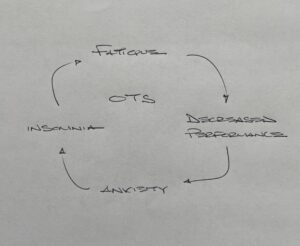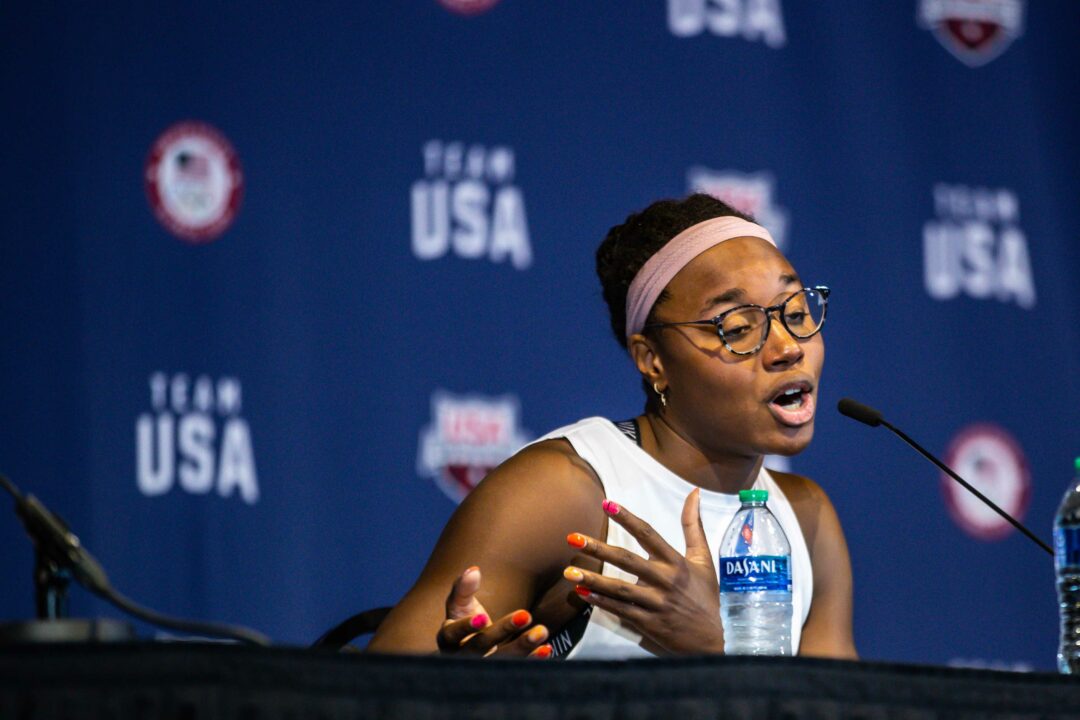This article was originally published on June 21, 2021.
During last week’s U.S. Olympic Trials, news came to light that four-time Olympic medalist Simone Manuel had been diagnosed with Overtraining Syndrome (OTS) around early March, and ended up taking an extended three-week break out of the pool in April.
Manuel spoke openly about her experience with OTS after failing to advance to the final of the women’s 100 freestyle, the event in which she won 2016 Olympic gold and back-to-back World Championship titles in 2017 and 2019.
Manuel ended up qualifying for the U.S. Olympic team in the 50 free on Sunday night. After that victory, the 24-year-old mentioned that she wants to be a voice for other swimmers that have dealt with similar symptoms.
Below, find an overview of exactly what OTS is, and the resulting symptoms, from Shawn Trokhan, M.D.
Disclaimer: This is not medical advice.
I’ve gotten a lot of questions in and out of the office recently about Simone Manuel and Overtraining Syndrome (OTS). And so I thought it would be helpful to give a quick overview of what happened, and more importantly give insight into what to look for in young athletes as they work hard to achieve success at different levels.
I think the most important thing to discuss from the outset is “What is a Syndrome?” A syndrome is simply “a group of symptoms which consistently occur together, or a condition characterized by a set of associated symptoms.” A syndrome is not a disease per se. A syndrome is not necessarily testable with simple bloodwork or an x ray. It is just a group of symptoms commonly seen in a situation, many times affecting different body systems. As well, many times one symptom in a syndrome can lead a patient down a path to the other symptoms.
 In this situation, Overtraining Syndrome is a constellation of symptoms commonly seen with, simply enough, overtraining. These symptoms include fatigue, faster heart rate even well after practice, and sore muscles, which can lead to decreased performance. And here is where things get complicated. These symptoms, in an elite athlete with lots of the line, can lead to other symptoms. Decreased performance can lead to depression, loss of motivation, and anxiety. Which can lead to insomnia, leading to irritability, agitation, and weight loss. Which can lead back to fatigue and decreased performance. It’s an extraordinarily tough cycle, and it becomes even more difficult with large, looming deadlines like the Olympic Trials on the horizon.
In this situation, Overtraining Syndrome is a constellation of symptoms commonly seen with, simply enough, overtraining. These symptoms include fatigue, faster heart rate even well after practice, and sore muscles, which can lead to decreased performance. And here is where things get complicated. These symptoms, in an elite athlete with lots of the line, can lead to other symptoms. Decreased performance can lead to depression, loss of motivation, and anxiety. Which can lead to insomnia, leading to irritability, agitation, and weight loss. Which can lead back to fatigue and decreased performance. It’s an extraordinarily tough cycle, and it becomes even more difficult with large, looming deadlines like the Olympic Trials on the horizon.
We have a saying in my office. “Sometimes the fastest way to move forward is to Stop.” And so while I am not her treating physician, it sounds like Simone made a tough but necessary choice. She stopped. She broke the cycle, rested, recalibrated, and came back.
Overtraining Syndrome is something that can be seen at many levels of swimming. And I think we are all lucky to have had an athlete like Simone bring it to our attention, but more importantly, come out the other side successfully.
ABOUT SHAWN TROKHAN
Shawn Trokhan, M.D. graduated from Princeton University where he was an Ivy League Champion swimmer, NCAA All-America award winner three times, and Olympic Trials qualifier. He studied medicine at the Case School of Medicine and the Cleveland Clinic in Cleveland Ohio, then completed his orthopaedic surgery residency at Mount Sinai in New York City. Dr. Trokhan is currently in private practice in northern NJ. You can read more about him at www.Trokhan.com.

feel like most swimmers born before 1985 have experienced this
Why nobody talks about OTS in case of Mallory Comerford. She rosed to the prominence at the same time period as Manuel did. Her success was same rare in the history of American women sprint. She dropped in performance at the same time as Manuel did and same sharp. And nobody cares much – things happened.
Manuel said that she wasn’t good in January. Who trains hard during holiday season?
There were several veteran swimmers that swam at a level below their best at trials 21. Some I believe fell into over training due to the added stress of the additional year going into the olympics. Struggling harder to maintain their position under the stress of the Covid era.
I don’t think we can randomly assign this situation to any and all though without input from each.
It’s not that nobody cares about Mallory Comerford. She just hasn’t come out saying she was diagnosed with OTS. It would be presumptuous for Swimswam or anyone to speculate that she did.
Also, if you know anything about swimming in the US, the holiday season is prime time for intense training. It’s arguably the most gruesome training block of the year.
Manuel saw a doctor. She was diagnosed by a trained physician. Not sure why people continue to discredit her or have a hard time believing. If this had been any other top class swimmer you would take them at their word.
That is what confuses me most. What kind of test can be performed by doctor to conclude that an athlete is overtrained and that problem isn’t caused by something else not related to training process. So far it looks to me that if otherwise healthy person drops in performance then we have nothing else to suggest but overtraining because that was the main activity that person was involved into recently.
And what actually is a recovery, the term that is used in definition of OTS? Ok, if today I am able to do what I did day before yesterday and couldn’t do yesterday then we are saying that I recovered. But what was absent yesterday that is in body… Read more »
OTC = the sport of swimming
I assume this was supposed to say OTS. If so, it’s the perfect point of discussion. Is the entire sport built on a foundation of too much is never enough? My concern is more with the younger swimmers who train as if they are in college. Swimming has become a brutal sport on young athletes, physically and mentally. USA Swimming really needs to step in and provide an example of what a young athlete should look like by age. Might it be better to do a little less so kids can do more of other things? Parents will probably never follow the recommendations but USA Swimming has to at least try. What really is the right amount of training for… Read more »
Simone said she suffered from OTS and yet she chose to train with Bowman? How does it make sense?
OTS is not about how hard you train. It’s about how well you recover. I have not seen a history of OTS with Bob, or any other top coach really.
I think it comes along with high stress and the Covid era and delayed Olympics was high stress for many of the top swimmers. A blessing for some of those that were too early in their career the year before but a big time challenge for those that were dialed in going into 2020.
I like this reply. It’s more about the response to training, but I’m not sure that any one training program would have a predictable OTS response in all comers.
IMO: Overtraining is a result of too little recovery, improper nutrition, not systematically rotating through energy systems/building workload, and not paying attention to athletes (both coaches and athletes not paying attention).
There must be balance to limit risks.
Thanks coach! All coaches should care about more than their swimmers’ swimming. Their entire physical and mental health should all be prioritized, not if they can just swim.
I’m pretty sure this happened to me my senior year of college. I was diagnosed with fibromyalgia, but I stopped having symptoms a few years post college. I remember trying to do 100 repeats and going 10-15 seconds slower than typical. My body also just hurt all of the time, and I was exhausted. It was a crummy way to end my career, but it made even just competing at my conference meet feel like a big win. I don’t know what triggered it as I didn’t up my training in a significant way, but something just flipped in me. Thanks to Simone for bringing attention to this.
Being burned out to the point where your body is telling you to stop, is very real and should not be ignored.
That said, I think “overtraining syndrome” is a hokey diagnosis. Unless there is tangible proof via bloodwork, vitals, physical exam etc that in turn caused her to be on a path to a dangerous ailment, she (and others) was simply burned out.
Personally I wouldn’t have used that term publically but that is just me. Simone is one of the greatest athletes in the sport and I respect her for that. Just my $.02.
That is a criticism that is often applied to nearly any illness that is called a “syndrome”. A syndrome is a group of symptoms that often occur together and usually there isn’t a known cause. A disease, on the other hand usually has a well-defined reason.
When something is labeled a syndrome, it just means that medical researchers don’t understand it very well (yet). It doesn’t mean it isn’t real.
By no means do I believe Simone’s diagnosis was not legitimate, but the confusion is understandable from many people. A syndrome still usually does have an ability to confirm it via some sort of medical testing. Down syndrome, Edward’s syndrome, and Turner’s syndrome, for example, are chromosomal mutations and can be definitively tested as such. Autoimmune conditions like Sjogrens have inflammatory lab markers paired with very specific symptoms that apply to few, if any, conditions.
My guess is OTS is underdiagnosed and frequently referenced as burnout. HOWEVER, had she gotten blood testing done, there would have likely been elevated CPK-mm isoenzymes indicating skeletal muscle deterioration from overtraining and inability to get ahead of it with recovery without a substantial… Read more »
I swam all growing up thru HS then played bball in college. Weird combo I know. Serious topic – glad it was explained here. A great trainer I had once said “no such thing as over-training, only under-recovery”. This goes for both mental and physical recovery. Human bodies were created to take a beating (they can literally heal themselves), and proper recovery is what can separate great performances from average ones. Out of pool activities/livelihood can make a big difference in how the response to in the pool training.
Quick story – I hung with Ryan Murphy before Outside Lands (festival in San Francisco) in 2019. He said that in Oly years his out of the pool lifestyle does… Read more »